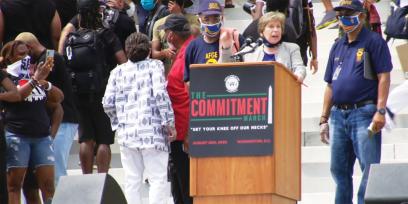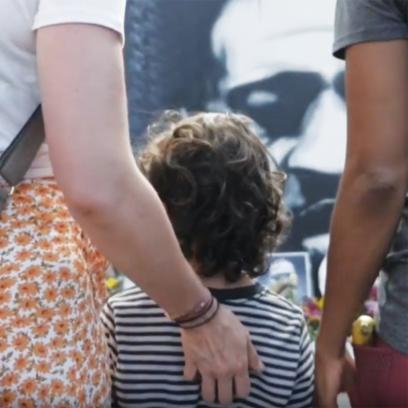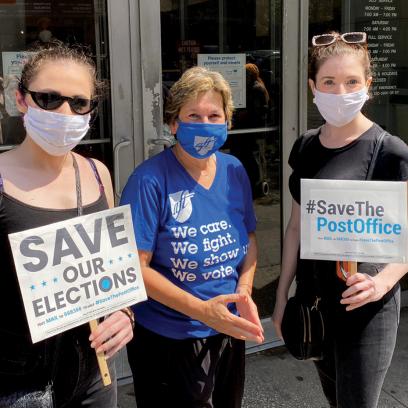The AFT has weathered many storms—and many existential threats, natural and ideological. From the Janus Supreme Court decision to COVID-19, from demonizers of our work like Michelle Rhee and Betsy DeVos to divisive politicians like Wisconsin’s Scott Walker and New York’s Rudy Giuliani, we have fought back against those who would rather starve public services, eliminate unions, and polarize the people than help fulfill the promise of America.
The AFT is built for this. We don’t back down. We care, fight, show up, and vote. Despite crisis after crisis, we have thrived because of your work and your activism. And even with everything that has been thrown at us, our union is growing.
But make no mistake: the threats before us today are unprecedented.
It is not just the three crises—the pandemic, the worsening economic inequality, and the long overdue reckoning with systemic racism; now we also face very real threats to our democracy and to the ability of every eligible American to safely and freely vote. These crises are all made worse by one person: Donald J. Trump.
I was in DC at the end of August for the anniversary of the March on Washington—a march that was peaceful in 1963 and peaceful in 2020. President Trump was in Washington, too, using the White House as a prop the evening before the march as he sowed the seeds of division. Just like he used St. John’s Church as a prop in June, after having peaceful protestors tear-gassed, so he could hold up a Bible for a photo op.
Let’s be clear: we must all take a stand against violence—just as we must all take a stand against systemic racism. What’s the key in moving from indifference to action and from ignorance to understanding? Teaching for racial equity and justice. This issue of American Educator features resources from AFT’s Share My Lesson that focus on nonviolent activism, engaging students in conversations on race and racism, and the need for diverse books (see here). The issue also includes compelling articles on youth-led activism, particularly on college campuses (see here). Young people speaking out propelled the creation of African American Studies and Black student organizations in higher education. Our youth are leading us to a better America with a stronger democracy.
How does the president of the United States not say the names that are on so many of our lips—Jacob Blake, George Floyd, Breonna Taylor—yet call violent white supremacists in Charlottesville “very fine people”? Why has the president cheered on caravans of white supremacists in Portland and refused to condemn the killings of two protesters in Kenosha by a 17-year-old white teenager?
This is not the way any president should act.
Rather than calming a tense nation, he is courting violence. Savvy political scientists believe he is not merely energizing his base; he is cultivating chaos to distract the nation from his inept handling of the pandemic. At the beginning of September, when the United States had over 6 million cases and 185,000 confirmed COVID-19 deaths, a comparison with other countries estimated that about 145,000 of those deaths would have been avoided if the US had an average—not good, just average—response to the pandemic. Instead, the US was far below average, with 4 percent of the world’s population but 22 percent of COVID-19 deaths.
Think about what could have happened if Trump had decided to fight, not deny or downplay, the virus.
President Trump claims that he has created the best economy ever. Before the pandemic, 40 percent of Americans couldn’t cover a $400 emergency, yet the rich were getting far richer. By the end of August, 25 million Americans had lost work—and economic inequality in America was on par with the Gilded Age.
President Trump has obliterated nearly every norm of our democracy, including running roughshod over the laws intended to prevent him from using his office for political or personal gain.
It’s no wonder that historians are sounding the alarm about the threat he poses to democracy. This threat is laid out in stark relief in this issue’s cover article, “The Crisis of American Democracy,” by Harvard professors Steven Levitsky and Daniel Ziblatt (see here). And it’s examined by former US Attorney General Eric H. Holder, Jr., in his article, “One Person, One Vote,” which chronicles America’s persistent struggle to ensure our most fundamental right (see here).
Where do we go from here? We have a choice between chaos or community, to paraphrase Dr. Martin Luther King, Jr.
Trump wants chaos. In addition to trying to turn peaceful protests into violent confrontations, he fomented turmoil in the reopening of schools. While the AFT created guides for safely reopening (aft.org/reopening-school-buildings-safely), Trump made baseless claims that children are “practically immune” to COVID-19 and ignored the risks to educators, staff, and families. How much more evidence do we need to see that in this election, we must vote like our lives depend on it?
We choose community. I usually love back to school, when students and school staff, renewed from the summer break, return full of excitement. I love visiting schools and college campuses, talking with students, and admiring the amazing work our members do. In a very real way, I am mourning that. I know many of you are, too.
We all want to be in-person with our students. But you can’t pit learning against lives—and yet that is what Trump and his acolytes have tried to do. That’s why we have done what we do best, marshalling our knowledge and expertise to fight for safe schools and colleges, on the streets, in the courts, and in coalition with parents and communities. In Florida, we sued the governor and education commissioner over their reckless demand that schools fully reopen despite the surge in infections. In Boston, Los Angeles, and many places in between, we negotiated key safety provisions and innovative distance- and blended-learning provisions. (And starting on page 31 of this issue, there are three articles to support remote and hybrid instruction.)
Whatever is needed to keep you, your students, and your loved ones safe, the AFT has your back.
Donald Trump isn’t up to the task of handling this public health crisis. He’s desperate to distract us from the fact that most Americans are decidedly not better off than they were four years ago.
Donald Trump’s economic policies help millionaires and billionaires, not average people. While his corruption threatens our democratic form of government, his secretary of education tries to take funds away from youth in under-resourced communities, and his administration is trying to take health insurance away from millions of people during a pandemic. In the face of these failures, his hobbling of the US Postal Service is an attempt to hamper voting by mail and to sow doubt about the election in the event he loses.
But Trump’s America is not America. We have an alternative.
From combating the pandemic to funding public schools, from addressing student debt and increasing economic opportunity to making sure healthcare is a right, Joe Biden and Kamala Harris have a plan.
They will fund, not starve, public education. The Biden administration will triple Title I funding, fully fund IDEA, expand the number of community schools, and provide universal pre-K. Biden and Harris have bold, comprehensive plans to
- address the climate crisis;
- protect and expand retirement security;
- make college affordable and help borrowers who are buried in student debt;
- give every American access to affordable health insurance;
- have a humane approach to immigration and affirm that Dreamers’ homes are here;
- uphold the rights of every American—regardless of gender, race, or religion; and
- create true economic fairness and opportunity.
It’s not just that they have these plans. It’s that they understand we must contain the pandemic before we can really reopen the economy as well as schools and colleges. Biden and Harris will make sure states, schools, colleges, hospitals, and other healthcare institutions have the resources they need.
That is what a caring, competent, effective administration would do. But none of this will happen if we don’t elect Joe Biden and Kamala Harris. Go to AFTvotes.org to find out how you can get involved. Make your own voting plan, and help your family and friends make their plans.
Amid all this chaos, you have been the calm. You have been the glue that has nurtured, supported, taught, fed, and cared for our communities.
Our nurses and health professionals who have faced down the pandemic with bravery, compassion, and expert care. Our public employees who have persisted on the frontlines, even though too many have not had the protections afforded other frontline workers. Our professors and teachers who have used ingenuity and expertise to keep students learning under such difficult and unprecedented circumstances. Our food service personnel, paraprofessionals, custodians, bus drivers, school secretaries, school counselors, and other school staff who have leapt into action to help feed kids who otherwise would go hungry, who have reached out to students and even visited their homes, who have cleaned and prepared schools for a safe return, and who have done things no one else will ever know, because they had to get done. You are the light, so that in the darkest days, hope has never been extinguished.
That’s who we are as a union. We care, we fight, we show up, and we vote. Thank you for all you do. And thank you for all you will do to make sure that on November 3, we elect Joe Biden and Kamala Harris, along with allies up and down the ballot who will help us move forward to create a better life and a better future for all Americans.
As the civil rights leader Congressman John Lewis often said, let’s “get into good trouble, necessary trouble.” Let’s keep doing that. Together. Because we know that, together, we can accomplish things that would be impossible on our own.
[photos: AFT]




